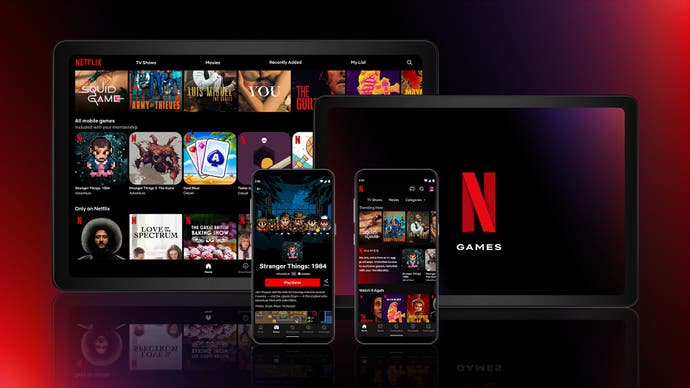Netflix reportedly looks to license GTA title as it moves into "higher-end" gaming
Following initial mobile offerings.
Netflix is reportedly looking to build upon its current, predominantly mobile-focused gaming offerings by introducing "higher-end" titles to its subscription catalogue - and is said to have had discussions about licensing a Grand Theft Auto game as part of the move.
The streaming company took its first tentative steps into gaming back in November 2021, with the release of five iOS and Android titles that could be downloaded and played as part of a Netflix subscription. Since then, its gaming catalogue has swelled to over 70 titles and it's made a number notable acquisitions, including Triple Town and Cozy Grove developer Spry Fox, The Walking Dead mobile developer Next Games, and Oxenfree creator Night School Studio.
Hints of more ambitious gaming plans at Netflix came with last November's announcement the company had set up a new Los Angeles studio - lead by former Overwatch executive producer Chacko Sonny - to create a brand-new triple-A, third-person RPG for PC. And a new report from the Wall Street Journal has shed further light on Netflix plans, saying the company is "taking steps to expand into higher-end games that can be streamed from TVs or PCs."
Netflix is said to have had discussions to release a game within Rockstar's Grand Theft Auto series via a licensing deal as part of its escalating gaming ambitions - but the Wall Street Journal offered no hint as to the title it might have been targeting, or if the discussions have borne fruit.
According to the publication, Netflix believes a more significant gaming presence will help it attract new subscribers and retain existing ones by giving them something to engage with between seasons of their favourite shows (and, more cynically, provides justification for increasing subscription prices). It's a strategy that seems to be paying off, albeit slowly.
The Wall Street Journal cites figures from app tracker Apptopia saying Netflix game downloads have risen from 30.4m to 70.5m in the last year. However, fewer than 1 per cent of Netflix's 238m subscribers are said to be playing its games daily and, more problematically, the current process of requiring users to download mobile games from their device's app store is creating a significant drop-off in engagement. The Wall Street Journal says only half of the subscribers who press the 'Get Game' button on the Netflix app go on to download and play games.
The company is already trialling game streaming in a bid to make accessing games through its service more seamless, and the technology is currently available for a "small number" of subscribers in Canada and the UK - with two games, Night School Studio's Oxenfree and "gem-mining arcade game" Molehew's Mining Adventure - available to stream on TVs.
Netflix's game streaming tech is being trialled in tandem with its new Game Controller app, which can be used to play games on a TV or computer. The Wall Street Journal reports some Netflix executives were concerned this virtual controller approach might limit the kinds of games the company can offer - action-heavy games would, for instance, more likely require a traditional game controller - but the company opted to take the phone approach anyway.
According to the the publication, the spectre of Google's failed Stadia has loomed large during internal meetings at Netflix, with some employees asking why the company "is looking to go deeper into a market where such a titan has failed". Google's Stadia did, of course, arrive in a blaze of publicity back in 2019, but the company opted to pull the plug in January this year after the game-streaming service struggled to gain traction with users.


